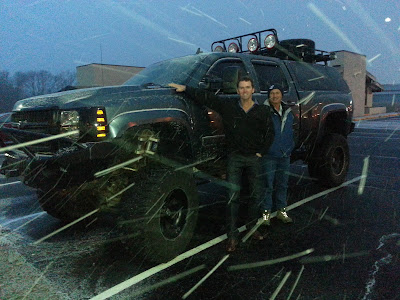I'm always amazed at the size of everything in North America.Everywhere you look, stuff has been up-sized.
I guess that comes with having a big country and ample room to swing an eighteen wheeler !
Yes, the stripes on the photo is snow, and yes it was cold - around minus 10C
Now that I have you attention on things big, our next stop is at a dairy farm in North Western Indiana.
Today we were treated to a tour of Fair Oaks Dairy Farm in North West Indiana and a meeting with the CEO Gary Corbett.
Fair Oaks was established in 1998 with the purchase of 1000ac and has grown to 19,000ac today. The enterprise is owned by 10 families and has its roots in California where a cooperative structure was established in the 1970s. Total cow numbers throughout the US totals some 110,000!
The facility at Fair Oaks currently milks 32,000 cows three times a day through 10 seventy two bale rotary sheds. Current expansion will have another barn to up and running in two weeks. Gary suggested that the optimum size for the site would be 40000 cows, based on available land and feed. No more than 30% of feed is bought in.
Milk sold throughout the US and is dependent on season as to where it is directed but will go as far as Florida. The price received is dependent on world powder price and Gary is very aware of the current drought conditions in New Zealand and how that is influencing pricing. Just shows how far reaching the NZ drought is !
Feed is made up corn silage, alfalfa hay and silage, corn, soy, cotton meal and distillers grain from ethanol plants. The only job contracted out on the farm is the silage cutting, when contractors come in with 25 silage harvesters to cut the 500,000+ tons required to feed the cows.
A vacuum system for removing effluent from barns and send it to a sand extraction system, with the sand either reused or spread on the land. Effluent is then put through the Bio Digestion system where enough energy is produced to make the whole operation self sufficient in energy. Even the trucks in the fleet run on the bio gas, or CNG. The logistics of running the fleet around the country with limited access to fuel was overcome in a logical way. 'We are building a chain of gas stations down to Florida, one more and we will have a clear run !' Currently the trailers are dropped and picked up by diesel trucks for the last stretch.

Once the effluent is out if the digester it is separated with solids used as fertiliser and compost and water reused through the dairy and pumped through miles of pipe and irrigators. Macro nutrients are extracted through a complex centrifugal process and nitrogen is stabilised through a tower system using sulfuric acid.
The Fair Oaks unit employs 450 staff most of which are Espanic and earn around $40,000 per year. Young stock are farmed out, often to Amish communities, from weaning until 60 days prior to calving when they are bought back to the farm of origin. Steers are either sold or raised on co-op farms around the country.
Fair Oaks also boasts a huge restaurant and cheesery as well as farm tours and entertain around 500,00 visitors per year.This adds value to the product, but perhaps more importantly it brings the public closer to where their food is produced and helps to bridge the gap.


Fair Oaks is a very well run operation, which leading the way in environmentally sustainable farming. The fact they are transparent in the way they interact with the consumer is testament to this.
Thank you to Gary and his team for making us so welcome and taking the time to see use.






No comments:
Post a Comment